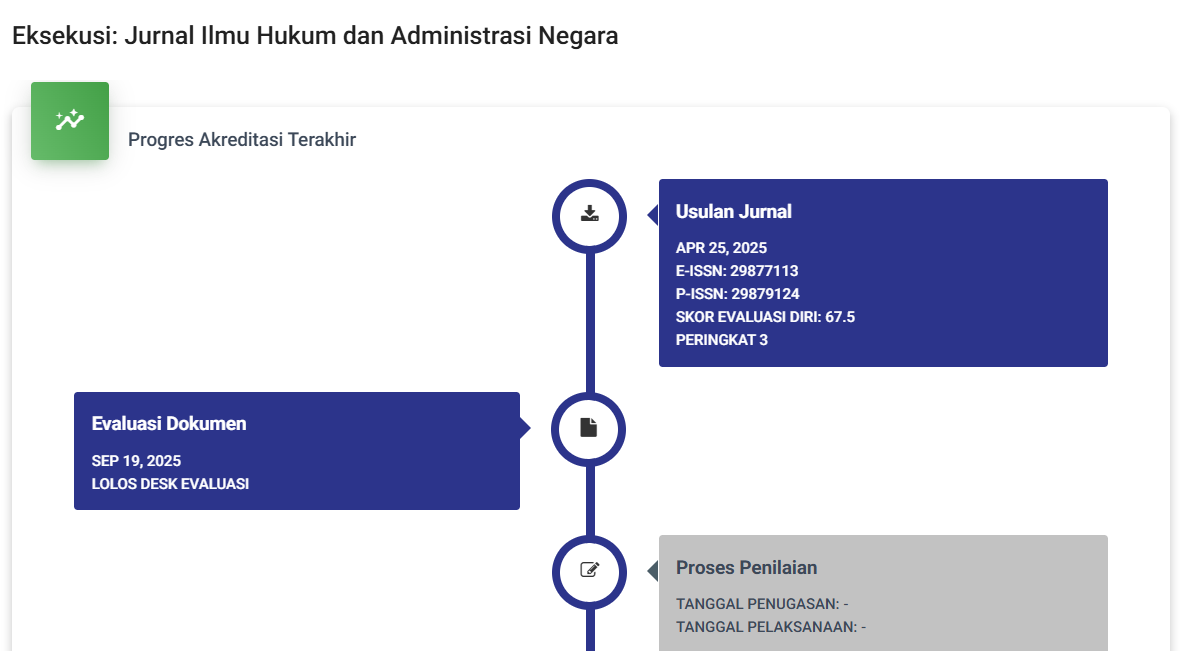Meningkatkan Transparansi dan Akuntabilitas Pemerintah Melalui Teknologi Digital dan Partisipasi Publik dalam Upaya Pemberantasan Korupsi
DOI:
https://doi.org/10.55606/eksekusi.v2i4.1553Keywords:
Anti-Corruption, Corruption, Digital Technology, PublicAbstract
Corruption is one of the biggest challenges faced by many countries, including Indonesia. Corrupt practices not only harm the state’s finances but also erode public trust in the government. This study aims to explore how digital technology and public participation can be effectively used to enhance government transparency and accountability in efforts to combat corruption. This research employs a descriptive qualitative method with a literature review and document analysis approach. Data is collected from various relevant literature sources and official documents to analyze the use of digital technology and public participation in enhancing government transparency and accountability in anti-corruption efforts. The results show that digital technologies, such as e-government, e-procurement, blockchain, big data analytics, open data, whistleblowing systems, and digital payment systems, can facilitate broader and faster access to information and increase public participation in government oversight. Public participation, through active involvement in reporting and monitoring, can raise public awareness of corruption issues and strengthen anti-corruption efforts. This study concludes that the combination of digital technology and public participation has great potential to create a more transparent and accountable government. Recommendations include the development of better technological infrastructure, increased digital literacy among the public, and the promotion of public participation in oversight processes. By implementing these strategies, it is hoped that a cleaner and more trustworthy government can be achieved, ultimately improving public welfare.
References
Ahmad, S., Singh, P., & Sagar, A. K. (2018). A Survey on Big Data Analytics. Proceedings - IEEE 2018 International Conference on Advances in Computing, Communication Control and Networking, ICACCCN 2018, 4, 256–260. https://doi.org/10.1109/ICACCCN.2018.8748774
Amali Fahmi Addiani, F. (2023). BLOCKCHAIN UNTUK SISTEM PENYIMPANAN DATA PADA ORGANISASI PEMERINTAH. Journal of Empowerment Community and Education, 3(2), 57–67. https://jurnalpengabdian.com/index.php/jece/article/view/796%0Ahttps://jurnalpengabdian.com/index.php/jece/article/download/796/118
Azmi, I. F., & Nugroho, A. A. (2023). Anti-corruption system 4.0: The adoption of blockchain technology in the public sector. Integritas : Jurnal Antikorupsi, 9(1), 93–108. https://doi.org/10.32697/integritas.v9i1.985
Bunga, M., Maroa, M. D., Arief, A., Djanggih, H., Hukum, F., & Gorontalo, U. (2019). PEMBERANTASAN TINDAK PIDANA KORUPSI. 15(1), 85–97.
Cahya, D. A. D., Tarigan, J. S. R., & Rivaldo, T. (2021). Urgensi Open Government Melalui Inisiatif Open Data dalam Mencegah Korupsi Anggaran Penanganan Covid-19 di Indonesia. Journal of Governance Innovation, 3(1), 33–57. https://doi.org/10.36636/jogiv.v3i1.503
CHAIRI, N., INDRIANI, M., & DARWANIS, D. (2022). Kompetensi, Moralitas Dan Sistem Whistleblowing Dalam Pencegahan Fraud: Studi Empiris Pada Organisasi Pemerintahan Indonesia. Media Riset Akuntansi, Auditing & Informasi, 22(1), 119–142. https://doi.org/10.25105/mraai.v22i1.12655
Dedy Suryana, K. (2020). Peran Penting Tokoh Masyarakat Dalam Pemberantasan Korupsi. Jurnal Ilmiah Raad Kertha, 2(2), 48–57. https://doi.org/10.47532/jirk.v2i2.161
Delimaya, N., & Sudiarti, S. (2022). Analysis of the E-Procurement System of Goods and Services for the Auction of Computers and Laptops at PT Pelabuhan Indonesia (Case Study of Pelindo 1 Belawan). Jurnal Emba Review, 2(1), 133–140. https://doi.org/10.53697/emba.v2i1
Faris, A., Harahap, R., & Harahap, A. M. (2023). Peran digitalisasi dalam meningkatkan partisipasi publik pada pengambilan keputusan tata negara. 9(2), 769–776.
Gultom, M. F., Simanjuntak, L., Dewi, A. E., Widiyani, H., Raja, U. M., & Haji, A. (2024). Peran Teknologi Informasi Dalam Pencegahan korupsi (Studi Kasus Implementasi Sistem E-Govemment). Jurnal Ilmu Hukum, 1(2), 33–42. https://doi.org/XX..XXXXX/syariah
Gunawan, C. I. (2015). SISTEM INFORMASI MANAJEMEN DAN E-GOVERNMENT (B. C. Dharmawan (ed.); 1st ed.). CV. IRDH (Research & Publishing).
Hafidhigbal, N. (2024). IMPLEMENTASI MODEL INDOBERT UNTUK KLASIFIKASI JENIS TINDAK PIDANA KORUPSI KLASIFIKASI JENIS TINDAK PIDANA KORUPSI. Universitas Islam Negeri Syarif Hidayatullah Jakarta.
Herlen, A. T., Putriana, V. T., & Yohana, D. (2021). Implementasi Kebijakan Transaksi Non Tunai Pemerintah Daerah di Indonesia. Jurnal Ilmiah Universitas Batanghari Jambi, 21(1), 80. https://doi.org/10.33087/jiubj.v21i1.1235
Lamijan, & Tohari, M. (2022). DAMPAK KORUPSI TERHADAP PEMBANGUNAN EKONOMI DAN PEMBANGUNAN POLITIK. Jurnal Penelitian Hukum Indonesia, 3(02), 40–59.
Laming, R. F., Anwar, A. I., Rahmi, S., & Soumena, F. Y. (2023). Pengaruh e-government terhadap Pemberantasan Korupsi: Systematic Literatur Review. SEIKO : Journal of Management & Business, 6(1), 97–106.
Lukita, C. (2020). Penerapan Sistem Pendataan Hak Cipta Content Menggunakan Blockchain. ADI Bisnis Digital Interdisiplin Jurnal, 1(2 Desember), 40–45. https://doi.org/10.34306/abdi.v1i2.120
Mahsitah, I. S. (2020). Pengaruh Skeptisme Profesional, Pengalaman Audit Investigatif, Whistleblowing System, Penegak Hukum Dan Toleransi Masyarakat Pada Korupsi Terhadap Kemampuan Auditor Dalam Mendeteksi Fraud [Universitas Islam Indonesia]. https://doi.org/10.1016/j.jnc.2020.125798%0Ahttps://doi.org/10.1016/j.smr.2020.02.002%0Ahttp://www.ncbi.nlm.nih.gov/pubmed/810049%0Ahttp://doi.wiley.com/10.1002/anie.197505391%0Ahttp://www.sciencedirect.com/science/article/pii/B9780857090409500205%0Ahttp:
Nisak, K., Riza, S., & Amiruddin, A. (2023). Pentingnya Trasparansi Keuangan Negara Dalam Meningkatkan Integritas dan Meminimalisir Tindak Pidana Korusi di Suatu Negara. Ameena Journal , 1(2), 223–231.
Nugroho, F. H. E. (2014). Tindak Pidana Korupsi Secara Elektronik. Jurnal Dinamika Hukum, 14(3), 540.
Patul, D., Kornelis, Y., & Zukriadi, D. (2024). Penguatan Mekanisme Check and Balances Untuk Mencegah Korupsi Dalam BUMN: Perspektif Hukum Ketatanegaraan. CAUSA Jurnal Hukum Dan Kewarganegaraan, 5(4), 1–6.
Rizqulloh, L., & Noor, F. A. (2020). Analisis Peranan Whistleblowing System Sebagai Upaya PencegahanTindak Pidana Korupsi Pada Bidang Kesehatan di Indonesia. The 11th University Research Colloquium 2020 , 1(1), 256–262.
Sasongko, W. (2017). KORUPSI (A. Kholiq (ed.)). Relasi Inti Media.
Soegiono, A. N. (2017). Agenda Open Government Memerangi Korupsi Melalui Inisiatif Open Data. Integritas : Jurnal Antikorupsi, 3(2), 1–36. https://doi.org/10.32697/integritas.v3i2.98
Sumantri, I. (2023). Transparansi Dalam Pemerintahan: Tinjauan Kegagalan Pencegahan Korupsi Di Indonesia. Journal of Scientech Research and Development, 5(1), 97–109. https://doi.org/10.56670/jsrd.v5i1.110








